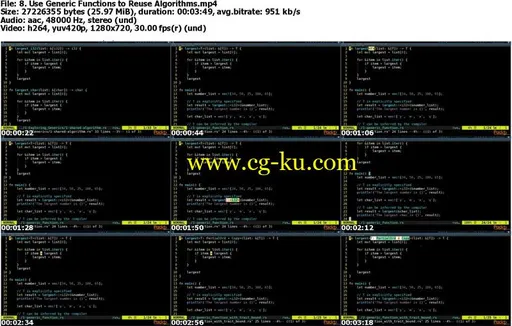Created by Packt Publishing | Video: h264, 1280×720 | Audio: AAC 48KHz 2ch | Duration: 06:16 H/M | Lec: 68 | 2.09 GB | Language: English | Sub: English [Auto-generated]Use generics, traits, and macros to write clean and reusable Rust libraries that are easy to understand and maintainWhat you’ll learnThis course is aimed at developers, C/C++, Rust & System developers who are familiar with programming and want to learn how to code in Rust and re-use Rust code and libraries from scratch.
RequirementsThis course is aimed at developers, C/C++ developers & system developers who are familiar with programming and want to learn how to code in Rust and re-use Rust codessss.
DescriptionRust is a systems programming language with a focus on safety, especially safe concurrency, supporting both functional and imperative paradigms, syntactically similar to C++, but its designers intend it to provide better memory safety while still maintaining performance.
With this hands-on, practical course, you’ll begin from scratch by getting familiar with the basic syntax and concepts of Rust, defining functions and creating variables & much more.
Then you’ll learn to test your code by building a simple crate with a tested, usable, well-documented API using Cargo & RustDoc.
Next, you will work with different forms of code reuse, loops, map, filter and fold to save time and resources & to use your code in a reusable manner in your apps.
By end of this course you will be able to avoid code duplication and write clean reusable code, also you’ll be comfortable building various solutions in RustContents and OverviewThis training program includes 2 complete courses, carefully chosen to give you the most comprehensive training possible.
The first course, Learning Rust begins by getting familiar with the basic syntax and concepts of Rust, from writing a Hello World program to defining functions and creating variables.
Then you’ll see how to manage toolchains with Rust up and build your first command-line program.
Moving on, you’ll explore Rust’s type system to write better code and put it into practice in a simple markup language.
You’ll learn to use Rust’s functional programming features to perform a physics simulation and use the Rayon crate to parallelize your computations.
Finally, you’ll discover the best practices and test your code by building a simple crate with a tested, usable, well-documented API using Cargo and RustDoc.
By the end of the video, you’ll be comfortable building various solutions in Rust.
You’ll be able to take advantage of Rust’s powerful type system and a rich ecosystem of libraries, or “crates”, available through the Cargo package manager.
The second course, Building Reusable Code with Rust will start with teaching you how to build reusable Rust code so that you can stop copying and pasting the code.
Write code that can adapt to many different usages.
You will reuse code by using advanced features such as traits, generics, and macros.
You will work with different forms of code reuse, loops, map, filter and fold to save time and resources.
Achieve higher-level reuse without sacrificing runtime performance.
Organize your code into modules and crates to publish them to crates .
io.
By the end of the course, you will be able to avoid code duplication and write clean reusable code.
Who this course is for?Discover the advantages of the Rust up toolchain manager and the Cargo build toolPrevent data races and memory corruption by controlling exclusive versus shared accessBuild powerful abstractions with traits and bounded genericsCreate concise pipelines with closures and iteratorsUnderstand generics and learn to use it to abstract algorithms for multiple data typesDefine and enforce clear interface using traitsExplore how the standard library uses features such as generics, traits, and macrosStructure your code with modules and crates and publish them online

